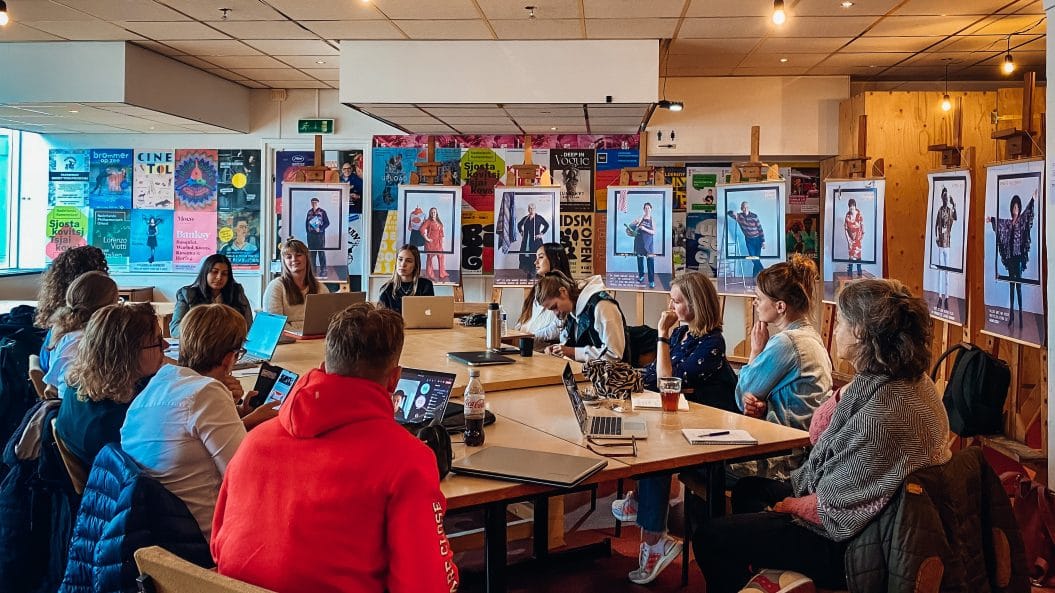In September 2021, a total of 40 students from our Communication, Creative Business, Facility Management, Leisure & Events Management and Tourism Management programmes, together with a group of exchange students from our partner universities in Belgium, Germany and Spain, started the Lab track within the Amsterdam ULT Lab. Together with our partners, they worked on a number of challenges. A brief description of the projects is provided below:
Long tracks
During the long track, the students work on a challenge for one of our partners within a multidisciplinary team. The long track lasts 20 weeks (1 semester) and consists of 4 major climbs divided into the discover & define phase, development phase, design phase and deliver & document phase. During the long track, students are given more time to develop a concept and work out the details.
Partner: Visit Beemster
Challenge: Reinvent Leisure & Tourism – Developing an ‘experience’ for visitors with the focus on the area between Amsterdam-Noord and Alkmaar.
For this project, the students are designing a pure, authentic, social and fair concept that focuses on the cultural history of the landscape of the recreation authorities and Beemster and uses Amsterdam-Noord station as a starting point and access point. It is a concept that will attract visitors on the one hand and create a positive social impact on the other. Our students will also pay attention to aspects such as water, food, cultural heritage and war/security with regard to the history of the area. Ultimately, it is about designing ‘experiences’ that are unique and memorable but also educational.
Partner: SAIL
Challenge: Developing a ‘positive provocation’ in the context of the SAIL event in Amsterdam
Our students are designing a concept that connects young people with the city of Amsterdam, the port and its history, in order to ensure that they know what significance SAIL can have for their generation as an event. SAIL is a five-yearly, nautical public event that connects the whole world. In 2015, SAIL attracted over 2.4 million visitors. In 2020, the event was cancelled as a result of the coronavirus measures. The event will take place once again in 2025.
Positive provocation as a concept means thought-provoking statements, unexpected actions, challenging events or random objects in the public space. These interventions will positively surprise, inspire or provoke younger visitors, passers-by or participants, making them think about social issues that are related to SAIL in a relevant way. At a minimum, they will challenge people to engage in dialogue/interaction and ideally to take action. The current issues and situations involving sustainability and inclusion that are taking place around the IJ, the banks and the quays take centre stage in this project. Examples include water quality, gentrification, accessibility and mobility. Our students will design, realise and test ‘Positive Provocations’ with courage and imagination.
Short tracks
During the short track, the students work on two challenges for one or more of our partners within a multidisciplinary team. The short track lasts 2 x 10 weeks (together totalling 1 semester). The challenge here is to quickly find a possible approach to a ‘wicked problem’. In real working life, after all, a solution may also have to be developed within a very short period of time. The students will therefore learn how to deal with time pressure and make choices.
Partner: Public Prosecution Service
Challenge: ‘A pill here, a line there’ – Our students have been asked to find a constructive and positive way to draw the attention of young people to the problems and the social and criminal impact of drugs.
The Public Prosecution Service is responsible for the investigation and prosecution of criminal offences. It leads the investigation, appears in court and ensures that the penalties are enforced. Partly as a result of various publications (such as the report ‘De Achterkant van Amsterdam’ (The Hidden Side of Amsterdam) and the criticism of this report) and the murder of lawyer Derk Wiersum and crime reporter Peter R. de Vries, the discussion about the normalisation of drug use (coke, ecstasy) in the Netherlands and the underlying criminal world has flared up. The Public Prosecution Service notes that discussions on this issue often have a polarising effect. Pointing fingers at each other usually keeps the real conversation from happening and also prevents awareness of the world behind it. Without wishing to moralise, standardise and/or accuse, the Public Prosecution Service is asking our students to find a constructive and positive way to involve young people in making the social impact of drugs visible and discussable. How can they ensure an open discussion, raise awareness and increase involvement?
Partner: Municipality of Amsterdam – placemaking on Buikslotermeerplein
Challenge: Developing a concept that brings together old and new residents of Amsterdam-Noord
Our students have been asked to come up with a concept for young locals that will bring the residents of Amsterdam-Noord closer together and stimulate conversation between the various parties. This is because the significant transformation of the neighbourhood is having a major impact on the lives of the people in the area that is not always positive. Together with the municipality and the learning coaches of the Lab, our students will come up with possible solutions that give the various social groups the opportunity to come together and connect with each other. Since 2020, the municipality has been working on livening up the area around Buikslotermeerplein and bringing different social groups together as a result, so that everyone feels at home and welcome in Amsterdam-Noord. Cinekid, one of our partners, is also affiliated with the challenge. This organisation organises the annual Cinekid Film Festival, the largest children’s media festival in the world, on Buikslotermeerplein. Cinekid Film Festival is an example of how connecting people can function on a small scale. Students should therefore take bridging the differences between local residents into account when co-designing a concept.


